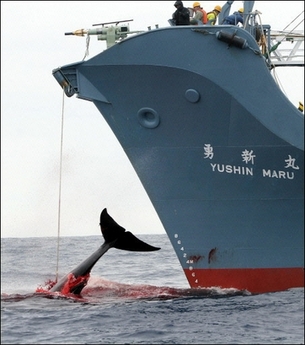Japan humpback whale hunt largest since 1960s
(Xinhua)
Updated: 2007-11-19 20:32
Updated: 2007-11-19 20:32
BEIJING -- A Japanese whaling fleet hunting protected humpback whales to kill sailed toward Antarctica waters Monday, while the fleet itself is the object of a hunt by Greenpeace.
Greenpeace said its protest ship Esperanza was searching for the fleet south of Japanese territorial waters and would shadow the ships to the South Pacific to try to curtail their catch.
The Japanese fleet was embarking on the country's largest whaling expedition, targeting protected humpbacks for the first time since the 1960s. In a farewell ceremony Sunday for the four-ship expedition, officials told a crowd at the southern Japanese port of Shimonoseki that Japan should preserve its whale-eating culture.
The whalers plan to kill up to 50 humpbacks in what is believed to be the first large-scale hunt for the once nearly extinct species since a 1963 moratorium in the Southern Pacific put the giant marine mammals under international protection.
The mission also aims to take as many as 935 minke whales and up to 50 fin whales in what Japan's Fisheries Agency says is its largest-ever scientific whale hunt. The expedition lasts through April.
Japan says it needs to kill the animals in order to conduct research on their reproductive and feeding patterns. While scientific whale hunts are allowed by the International Whaling Commission, or IWC, critics say Japan is simply using science as a cover for commercial whaling.
The Japanese hunt, which puts meat from the whales on the commercial market, is growing rapidly despite an increasingly vocal anti-whaling movement. This winter season's target of up to 1,035 whales is more than double the number the country hunted a decade ago.
Japan argues that it should have the right to hunt whales as long as they are not in danger of extinction.
|
||
|
|
|
||
|
||
|
|
|
|

